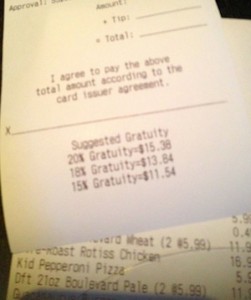 If you’re the owner of a small business that employs people who work for tips, your choice of payment system is holding their livelihood in the palm of your hand. A lot of considerate bar owners, restaurant owners, and more will think twice before they institute any changes that could adversely affect the people who work for them. This is both kindness and practicality.
If you’re the owner of a small business that employs people who work for tips, your choice of payment system is holding their livelihood in the palm of your hand. A lot of considerate bar owners, restaurant owners, and more will think twice before they institute any changes that could adversely affect the people who work for them. This is both kindness and practicality.
If you can’t get the people working for you a decent living wage then they’re going to leave, you’re going to have high turnover, and everything that you wanted or worked for is going to blow up in your face. That’s not where anyone wants to be.
So, when you’re looking to trade out the clunky old cash register for something with a bit of a modern flair, you have to consider what it’s going to mean for everyone who depends on you to put some food on the table and let them pay their rent. Well, the results on mobile point of sale systems, credit card reading apps, and more are in and the results are only good.
Tips Fall When People Have to Do Math
If you run a bar, then you know this very well; when people get drunk, tips get crazy. They’re either way too high or way too low, and typically, they’re on the low side. Even drunk people hate doing math and want to save money. That’s why it’s so harsh to get a flat ten dollar tip after serving up complex cocktails all night.
It’s terrible when a drunken person tries to do math and ends up leaving you an 8 percent tip instead of a 15 percent tip. When people have to put in a lot of effort, good tips simply don’t happen. This is the first building block to explain why digital tips are so good when compared to traditional cash or write-in tipping methods.
Present Percentages Send Tips Through the Roof
When businesses make the switch to accepting credit cards for the first time or they change their credit card practices to more easily add tips (say, from making the customer write it in themselves to letting them either select a preset amount like $1 per tap or calculating options for the percentage of their bill (typically 15 percent, 20 percent, and 25 percent)), they see a sudden boom in tips.




